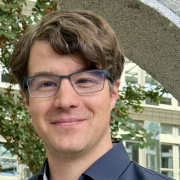Prof. Dr. Daniel Leidner
About
As of October 2024, Daniel Leidner has taken on the role of Cooperation Professor at the University of Bremen, where he earned his doctorate in Artificial Intelligence and Robotics in 2017.
Daniel Leidner also is a researcher at the German Aerospace Center (DLR), where he has been contributing to the Institute of Robotics and Mechatronics since 2011. Since 2017, he has led the Semantic Planning Group at DLR, focusing on advanced task planning for autonomous robotic systems, and the Fault-Tolerant Autonomy Architectures group, where he explores innovative solutions to enhance the reliability and effectiveness of robotic operations in dynamic environments. His expertise was awarded in 2024 when he received the prestigious ERC Starting Grant for his project RECOVER.ME, aimed at advancing AI-driven recovery robotics.
In addition to his research endeavors, Daniel Leidner served as an advisor to the German Federal Government from October 2023 to July 2024, where he played a crucial role in developing a national strategy for AI-based robotics.
Research
Daniel Leidner is a leading researcher focused on developing robust and resilient robotic systems capable of autonomous operation in complex environments. His work emphasizes not only preparing machines for predictable scenarios but also enabling them to flexibly respond to unforeseen events. Leidner's ERC Starting Grant project RECOVER.ME aims to equip robots with metacognitive abilities to autonomously manage hardware malfunctions by integrating formal reasoning with Vision-Language Models. This innovative approach enhances the resilience and efficiency of space robots, reducing the need for manual intervention during missions, and leverages insights from cognitive psychology for improved problem-solving capabilities.
Projects
RECOVER.ME
FUTURO: https://futuro.dlr.de/
EASE: https://ease-crc.org/
OPERA: https://www.dlr.de/de/rm/forschung/projekte/opera
Smile2gether: https://www.dlr.de/de/rm/forschung/projekte/smile2gether
Surface Avatar
CoViPa: https://www.dkfz.de/en/covipa/covipa.html
Publications (Selected)
A full list of publications can be found here: DLR Electronic Library
Adrian S. Bauer, Anne Koepken, and Daniel Leidner, “Multi-Agent Heterogeneous Digital Twin Framework with Dynamic Responsibility Allocation for Complex Task Simulation”, in Proc. of the International Conference on Autonomous Agents and Multiagent Systems (AAMAS), 2022 pdf.
Daniel Leidner “The COVID-19 Pandemic: An Accelerator for the Robotics Industry?”, IEEE Robotics and Automation Magazine (RAM), 2021 pdf.
Peter Schmaus, Daniel Leidner, Thomas Krüger, Ralph Bayer, Benedikt Pleintinger, Andre Schiele, and Neal Y. Lii, “Knowledge driven orbit-to-ground teleoperation of a robot coworker”, IEEE Robotics and Automation Letters 5.1, pp. 143–150, 2019 pdf.
Daniel Leidner “Cognitive Reasoning for Compliant Robot Manipulation”, Springer Tracts in Advanced Robotics. Springer International Publishing, 2019, Georges Giralt PhD Award (Best European PhD Thesis in Robotics), Helmholtz Doctoral Prize, MIT Technology Review Innovator under 35 Award pdf.
Adrian Simon Bauer, Peter Birkenkampf, Alin Albu-Schäffer, and Daniel Leidner, “Inferring Semantic State Transitions during Telerobotic Manipulation”, in Proc. of the IEEE/RSJ International Conference on Intelligent Robots and Systems (IROS), Madrid, Spain, October 2018 pdf.
Daniel Leidner, Georg Bartels, Wissam Bejjani, Alin Albu-Schäffer, and Michael Beetz, “Cognition-Enabled Robotic Wiping: Representation, Processing, Execution, and Interpretation”, Robotics and Autonomous Systems Special Issue on Semantic Policy and Action Representations for Autonomous Robots, 2018 pdf.
Daniel Leidner and Michael Beetz, “Inferring the Effects of Wiping Motions based on Haptic Perception”, in Proc. of the International Conference on Humanoid Robots (ICHR), Cancun, Mexico, November 2016, pp. 461-468, Best Interactive Paper Award Finalist pdf video.
Daniel Leidner, Alexander Dietrich, Michael Beetz, and Alin Albu-Schäffer, “Knowledge-Enabled Parameterization of Whole-Body Control Strategies for Compliant Service Robots”, Autonomous Robots (AURO): Special Issue on Whole-Body Control of Contacts and Dynamics for Humanoid Robots, vol. 40, no. 3, pp. 519-536, March 2016, Best WBC-Paper & Video Award Finalist PDF@Springer.
Daniel Leidner, Alexander Dietrich, Florian Schmidt, Christoph Borst, and Alin Albu-Schäffer, “Object-Centered Hybrid Reasoning for Whole-Body Mobile Manipulation”, in Proc. of the IEEE International Conference on Robotics and Automation (ICRA), Hong Kong, China, June 2014. pp. 1828-1835. pdf video.
Daniel Leidner, Christoph Borst, and Gerd Hirzinger, “Things are made for what they are: Solving manipulation tasks by using functional object classes”, in Proc. of the IEEE/RAS International Conference on Humanoid Robots, Osaka, Japan, November 2012, pp. 429–435 pdf video.
Prof. Dr. hc. Michael Beetz PhD
Head of Institute
Contact via
Andrea Cowley
assistant to Prof. Beetz
ai-office@cs.uni-bremen.de
Discover our VRB for innovative and interactive research

Memberships and associations:













